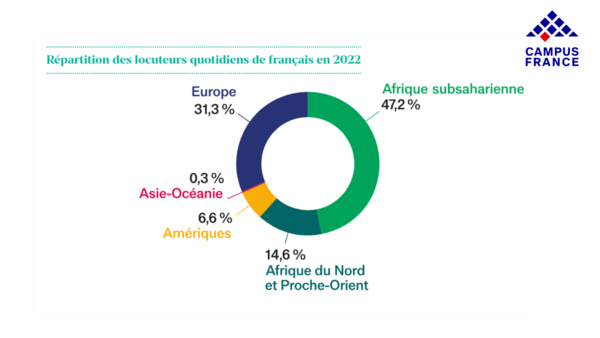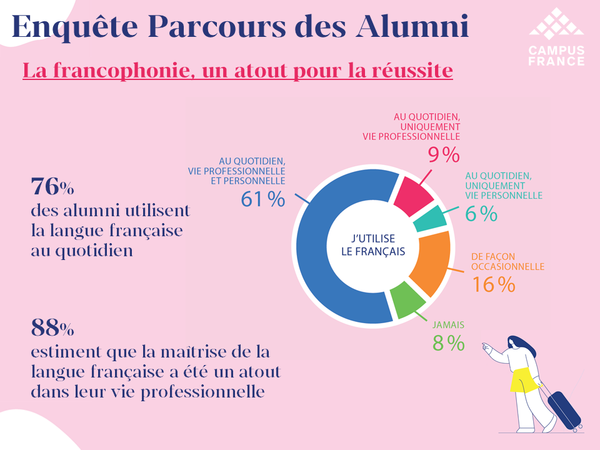
Francophonie, a vector of student mobility
For the first time in 33 years, France hosted the 19th Francophonie Summit on 4 and 5 October at the Cité internationale de la Francophonie in Villers-Cotterêts. An opportunity to remind the key figures proving that Francophonie is a powerful vector of student mobility.
Francophonie over the five continents
The International Organisation of La Francophonie (OIF) explains that over 321 million people speak French on a daily basis across five continents.

Sub-Saharan Africa, combined with the Indian ocean, boasts the highest number of speakers of the French language on a daily basis (47%), ahead of Europe (31%), North Africa and the Middle East (15%), the Americas (7%) and Asia-Oceania (less than 1%). Between 2018 and 2022, this number sharply rose in Sub-Saharan Africa and in the Indian ocean (+14%), then in North Africa and the Middle East (+6%).
Francophonie and student mobility
The OIF includes 54 members in their own right, 7 associated members and 27 observers. Crossing data on registrations in the French higher education system from the French Ministry of higher education and research shows that 50% of foreign students in France come from a member country, and 50% from other countries. Over five years, between 2018 and 2023, the growth of the number of students from member countries has been faster than average growth (+23% vs +17%). Francophonie has thus been a vector for student mobility.

French language at the heart of the study experience
Results from a study led by Campus France, in collaboration with the Verian institute (formerly Kantar Public) towards 10,000 international students who studied in France show that a study stay in France has significantly increased alumni’s level of French language. Although a small half of respondents declared themselves bilingual before their study stay in France (47%), this share increased to 76% at the end of the stay. About 80% of alumni now use the French language on a daily basis (professional and/or personal life).

Francophonie may also be studied
Training courses in relation with francophonie are related to studies in literature and language science, for specialisation in French language, linguistics, didactics, French as foreign language, French-speaking cultures and French civilisation, interculturality and multilinguism, international relations and diplomacy.
Courses in francophonie focus on training courses in Arts, literature and languages, Humanities and social sciences, Law, economics and management that offer options (international relations, cooperation, language science, education science, literature, didactics, linguistics, and more) and specialised courses.
Initial and continuing education focused on Francophonie institutions is available at Master level.
To find all higher training in relation with francophonie, check out the “field of study” factsheet by Campus France.

What is francophonie?
Since the first use of the term coined around 1880 by French geographer Onésime Reclus, francophonie is the whole of people and countries speaking French. The term has a capital letter when related to organisations and institutional relations between French-speaking countries.
- 5th most spoken language in the world
- Official language of 32 States and governments
- 321 million speakers (2022)
- 132 million learners of and in French
- 4th language most used on the Internet
Related contents
Recommended News




















































